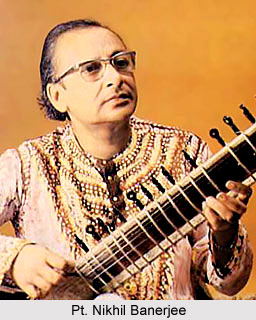 Nikhil Ranjan Banerjee (14 October 1931 - 27 January 1986) was influenced by his father, Jitendranath Banerjee who was an amateur sitarist. He started learning the instrument at the age of five. He had won an All-India sitar competition and became the youngest musician employed by All India Radio at the age of nine. Initially he started with Mushtaq Ali Khan but later on Birendra Kishore Roy Chowdhury, the zamindar of Gouripur in present-day Bangladesh, became his teacher. However his greatest inspiration and his guru had been Ustad Allauddin Khan from whom throughout his life he kept taking lessons from.
Nikhil Ranjan Banerjee (14 October 1931 - 27 January 1986) was influenced by his father, Jitendranath Banerjee who was an amateur sitarist. He started learning the instrument at the age of five. He had won an All-India sitar competition and became the youngest musician employed by All India Radio at the age of nine. Initially he started with Mushtaq Ali Khan but later on Birendra Kishore Roy Chowdhury, the zamindar of Gouripur in present-day Bangladesh, became his teacher. However his greatest inspiration and his guru had been Ustad Allauddin Khan from whom throughout his life he kept taking lessons from.
Ustad Amir Khan had influenced Banerjee`s musical development. In 1947 Banerjee met Ustad Allauddin Khan who became his main teacher along with his son, Ustad Ali Akbar Khan. Banerjee embarked on a concert career that took him to all corners of the world. He always remained a humble musician. He was awarded with the Padma Shri Award and in 1974 with Sangeet Natak Akademi Award.
A number of prominent sitarists have been influenced by his teaching and distinctive style. During his lifetime he recorded only a handful of recordings. At a young age of 54, Nikhil Banerjee died of a heart attack. He was a faculty member at the Ali Akbar College of Music in Kolkata at the time of his death. He was posthumously one of the awardees Padma Bhushan Awards in the same year as his death. He is survived by his wife Roma and two daughters.
He is known for his mastery in both melodic and rhythmic aspects of Indian music. He is known for his unique style of sitar playing. He interpreted ragas traditionally. He created two new ragas. He is regarded as one of the greatest sitarists of the 20th century and is often spoken of as being on a level with the other two masters Ravi Shankar and Ustad Vilayat Khan.
Discography of Nikhil Bannerjee:
* Afternoon Ragas (1970)
* Live: Misra Kafi (1982)
* The Hundred-Minute Raga: Purabi Kalyan (live) (1982)
* Immortal Sitar of Pandit Nikhil Banerjee, Ragas: Purabi Kalyan, Zila-Kafi, Kirwa (1986)
* Lyrical Sitar (1991)
* Live at De Kosmos: Amsterdam 1972 (1995)
* The KPFA Tapes: Berkeley 1968 (1995)
* Rag Hemant (1995)
* Le Sitar Du Pandit (1996)
* Raga Patdeep (1996)
* Live in Amsterdam 1984 (1997)
* Genius of Pandit Nikhil (live) (1998)
* Berkeley 1968 (1998)
* Live Concert, Vol. 2: India`s Maestro of Melody (1999)
* Pandit Nikhil Banerjee (live) (1999)
* Total Absorption (2000)
* Banerjee Live in Munich 1980 (2000)
* Morning Ragas: Bombay Complete Concert 1965 (live) (2000)
* Musician`s Musician (2001)
* India`s Maestro of Melody: Live Concert, Vol. 5 (2002)
* Alltime Classic, Vol. 1: Raag Bageshree (live) (2004)




















